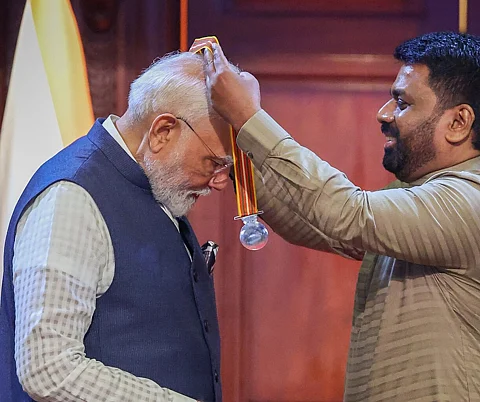

Indian Prime Minister Narendra Modi and Sri Lankan President Anura Kumara Dissanayake held talks in Colombo on Saturday, culminating in the signing of energy and defense agreements aimed at deepening bilateral ties. The deals signal New Delhi’s efforts to bolster its influence in Sri Lanka, which has been grappling with significant debt to China.
A five-year defense cooperation pact includes provisions for training Sri Lankan military personnel in India and enhancing intelligence and technology sharing. Modi emphasized the two nations' shared security interests, particularly in the Indian Ocean, through the Colombo Security Conclave—a regional grouping that also includes Bangladesh, the Maldives, and Mauritius.
"I am grateful to President Dissanayake for his sensitivity toward India’s interests. Our security is interconnected and interdependent," Modi said during a televised ceremony.
Dissanayake reaffirmed Sri Lanka’s commitment to preventing its territory from being used against India. "I have assured Prime Minister Modi that no one will be allowed to undermine India’s security from Sri Lankan soil," he stated.
The leaders virtually inaugurated a 120-megawatt solar power plant in Trincomalee, a northeastern district, marking the revival of a long-stalled Indian-funded project. Additionally, India and the United Arab Emirates announced plans to develop an energy hub in Trincomalee, which may include a multi-product pipeline and the modernization of a World War II-era oil tank farm.
"The UAE is a strategic energy partner for India, making it an ideal collaborator for this regional initiative," Indian Foreign Secretary Vikram Misri told reporters.
Sri Lanka’s economic crisis in 2022, which led to a sovereign default, shifted Colombo’s priorities, creating opportunities for India to step in with financial and material aid. However, China remains Sri Lanka’s largest bilateral creditor, holding over half of its $14 billion bilateral debt.
Dissanayake’s diplomatic balancing act was evident in his back-to-back visits to New Delhi in December and Beijing in January. While Sri Lanka recently secured a $3.7 billion Chinese investment for an oil refinery, it has also imposed restrictions on foreign research vessels—a move seen as addressing India’s concerns over Chinese surveillance activities.
Modi’s visit, the first by a foreign leader since Dissanayake took office, underscored India’s strategic outreach. The Indian leader was conferred Sri Lanka’s highest civilian honor, the Mithra Vibhushan, which he dedicated to India’s 1.4 billion people.
The two nations also finalized debt restructuring agreements, with Sri Lanka owing approximately $1.36 billion to Indian banks, according to Sri Lankan Finance Ministry data. Additional agreements covered power grid connectivity, digitalization, and healthcare cooperation.